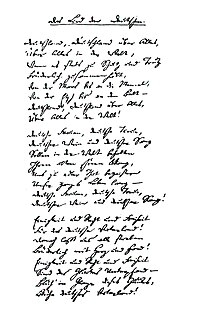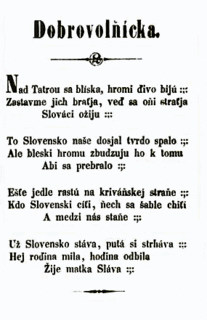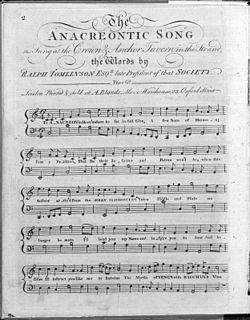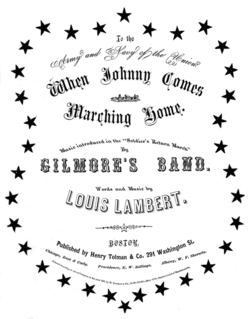
Alcaeus of Mytilene was a lyric poet from the Greek island of Lesbos who is credited with inventing the Alcaic stanza. He was included in the canonical list of nine lyric poets by the scholars of Hellenistic Alexandria. He was a contemporary of Sappho, with whom he may have exchanged poems. He was born into the aristocratic governing class of Mytilene, the main city of Lesbos, where he was involved in political disputes and feuds.

The "Deutschlandlied", officially titled "Das Lied der Deutschen", or part of it, has been the national anthem of Germany since 1922. In East Germany, the national anthem was "Auferstanden aus Ruinen" between 1949 and 1990.

In Norse mythology Valhalla (;) is the anglicised name for Old Norse: Valhǫll. It is described as a majestic hall located in Asgard and presided over by the god Odin. Half of those who die in combat enter Valhalla, while the other half are chosen by the goddess Freyja to reside in Fólkvangr. The masses of those killed in combat along with various legendary Germanic heroes and kings, live in Valhalla until Ragnarök when they will march out of its many doors to fight in aid of Odin against the giants.

"Nad Tatrou sa blýska" is the national anthem of Slovakia. The origins of it are in the Central European activism of the 19th century. Its main themes are a storm over the Tatra mountains that symbolized danger to the Slovaks, and a desire for a resolution of the threat. It used to be particularly popular during the 1848–1849 insurgencies.

"The Man in the Moon Stayed Up Too Late" is J. R. R. Tolkien's imagined original song behind the nursery rhyme "Hey Diddle Diddle ", invented by back formation. It was first published in Yorkshire Poetry magazine in 1923, and was reused in extended form in the 1954–55 The Lord of the Rings as a song sung by Frodo Baggins in the Prancing Pony inn. The extended version was republished in the 1962 collection The Adventures of Tom Bombadil.
"Joy to the World" is an English Christmas carol. It was written in 1719 by the English minister and hymnwriter Isaac Watts, and is usually sung to an 1848 arrangement by the American composer Lowell Mason. Its lyrics are a Christian reinterpretation of Psalm 98.

"The Anacreontic Song", also known by its incipit "To Anacreon in Heaven", was the official song of the Anacreontic Society, an 18th-century gentlemen's club of amateur musicians in London. Composed by John Stafford Smith, the tune was later used by several writers as a setting for their patriotic lyrics. These included two songs by Francis Scott Key, most famously his poem "Defence of Fort McHenry". The combination of Key's poem and Smith's composition became known as "The Star-Spangled Banner", which was adopted as the national anthem of the United States of America in 1931.

"When Johnny Comes Marching Home", sometimes "When Johnny Comes Marching Home Again", is a popular song from the American Civil War that expressed people's longing for the return of their friends and relatives who were fighting in the war.
"For He's a Jolly Good Fellow" is a popular song that is sung to congratulate a person on a significant event, such as a promotion, a birthday, a wedding, a retirement, a wedding anniversary, the birth of a child, or the winning of a championship sporting event. The melody originates from the French song "Marlbrough s'en va-t-en guerre".

"Ode on Melancholy" is one of five odes composed by English poet John Keats in the spring of 1819, along with "Ode on a Grecian Urn", "Ode to a Nightingale", "Ode on Indolence", and "Ode to Psyche". The narrative of the poem describes the poet's perception of melancholy through a lyric discourse between the poet and the reader, along with the introduction to Ancient Grecian characters and ideals.
"Dead Man's Chest" is a fictional sea song, originally from Robert Louis Stevenson's novel Treasure Island (1883). It was expanded in a poem, titled "Derelict" by Young E. Allison, published in the Louisville Courier-Journal in 1891. It has since been used in many later works of art in various forms.
"The Parting Glass" is a Scottish traditional song, often sung at the end of a gathering of friends. It has also long been sung in Ireland, enjoying considerable popularity to this day and strongly influencing the style in which it is often now sung. It was purportedly the most popular parting song sung in Scotland before Robert Burns wrote "Auld Lang Syne".

A drinking song is a song sung while drinking alcohol. Most drinking songs are folk songs or commercium songs, and may be varied from person to person and region to region, in both the lyrics and in the music.
"Midnight Special" is a traditional folk song thought to have originated among prisoners in the American South. The song refers to the passenger train Midnight Special and its "ever-loving light".
"Yo Ho " is the theme song for the Pirates of the Caribbean attractions at Disney theme parks. The music was written by George Bruns with lyrics by Xavier Atencio.
The Gower Wassail is a wassail song from Gower in Wales, UK. Wassailing is an ancient English Christmastime drinking ritual. The song is printed in A.L. Lloyd's book Folk Song in England (1967), having been heard from Phil Tanner. The song is English but in structure bears similarities to the Irish traditional song Here's a Health, which is in the same vein as The Liberty Song. Some of the lyrics closely resemble another popular wassailing song, 'Gloucestershire Wassail'

"Spanish Ladies" is a traditional British naval song, describing a voyage from Spain to the Downs from the viewpoint of ratings of the Royal Navy.

The alma mater of the University of Pittsburgh was adopted soon after the University changed its name in 1908 from the Western University of Pennsylvania to its current moniker. Lyrics were written by George M. P. Baird, class of 1909 and were set to the tune of what was then the Austrian National Anthem. A new tune for the "Alma Mater" hymn was composed by Charles W. Scovel, class of 1883, but it was not widely adopted and was either lost or became obscure.

Kära Syster is No. 24 in the Swedish poet and performer Carl Michael Bellman's 1790 song collection, Fredman's Epistles. The epistle is subtitled "Till kära mor på Bruna Dörren" ; its themes are drinking and death. One of his best-known works, it is set to a tune extensively modified from one by Egidio Duni for Louis Anseaume's 1766 song-play La Clochette. Bellman's biographer, Carina Burman, calls it a central epistle.

Hör klockorna med ängsligt dån or Fredman's Song no. 6 is one of the Swedish 18th century poet and performer Carl Michael Bellman's Fredmans sånger, written in 1769. It is subtitled Över brännvinsbrännaren Lundholm. It was originally one of the texts for Bellman's Order of Bacchus. It was first performed on 15 October 1769, and quickly became popular, spreading as a transcript. It is structured as a funeral oration for a member of Lundholm's Order, parodying the Swedish system of noble Orders.













